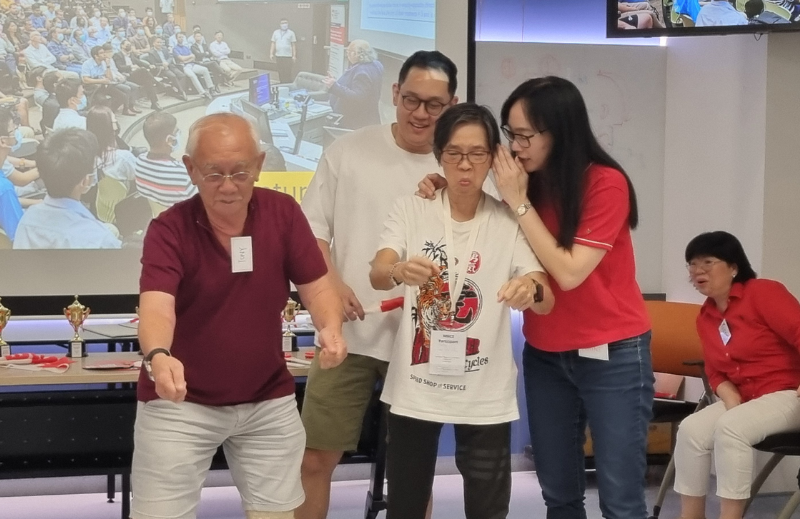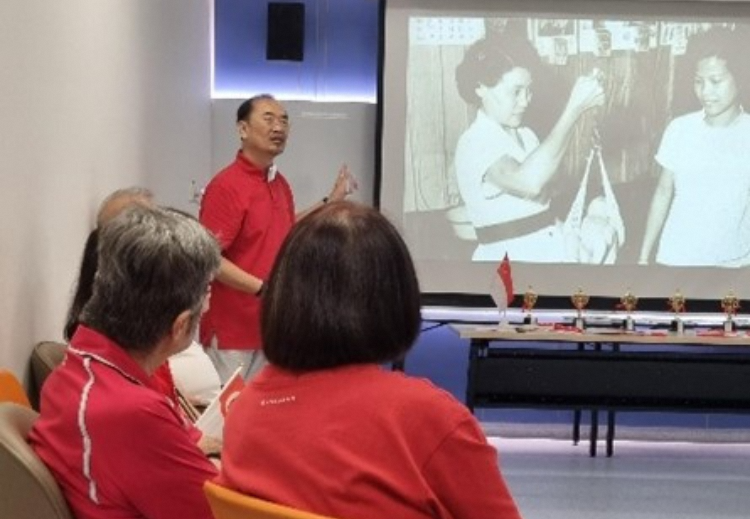National Neuroscience Institute will NEVER ask you to transfer money over a call. If in doubt, call the 24/7 ScamShield helpline at 1799, or visit the ScamShield website at www.scamshield.gov.sg.

A new programme offering reminiscence therapy and cognitive stimulation activities is providing symptom-relief and support to NNI patients with dementia and their caregivers.
Mdm Daisy Lee is 75 years old and weighs less than 45kg, yet in her daughter’s eyes she’s the strongest person she knows.
“My mother is my hero, my superwoman,” shares Daisy’s daughter, Elaine Loh. “She has survived leukaemia and breast cancer, and now she is living with dementia, but she never gives up.”
Daisy is living with semantic dementia which affects her ability to remember the meaning of words and objects – it is a rare form of dementia that affects the frontotemporal lobe of the brain and gets worse over time.
Daisy now has difficulty holding conversations and her short-term memory is also affected. But a new programme at NNI has helped to temporarily rekindle fond memories for Daisy and brought joy to her and her close-knit family.
The National Neuroscience Institute Integrated Cognitive Engagement (NNICE) - OWOW! Programme focuses on reminiscence therapy and cognitive stimulation activities. The 10-week group programme is primarily designed for people living with mild to moderate dementia, but it is also open to NNI patients aged 75 years and older with mild cognitive impairment, Parkinson’s Disease and/or stroke survivors with cognitive impairment.
Daisy and five other persons with dementia took part in the latest round of OWOW! with their caregivers. The session on 30 July included memories of previous National Day celebrations at the old National Stadium and singing National Day songs.
“My mother really enjoys the more active sessions with singing and dancing. We can see her becoming more engaged as her body and mind connect,” shares Elaine. “The session on old school days with photos of canteens and students brushing their teeth over the drain also sparked happy memories for my mother. When we got home, we continued the conversation to try to make the memories last as long as possible.”

Mdm Lee and her family playing charades at the OWOW! Programme
The OWOW! Programme began in May 2025. It is part of the Ecosystem of Dementia Care Programme which was established with a $9 million donation to improve the lives of persons with dementia and their families.
The first five weeks of OWOW! are conducted by Associate Psychologists from NNI who group-based intervention built on the principles of reminiscence therapy and cognitive stimulation therapy to engage persons with dementia.
“Reminiscence therapy involves discussion about past memories and experiences through the use of prompts such as, artefacts, photographs, music, and familiar smells, which can aid in memory retrieval,” explains Queenie Lim, Associate Psychologist, NNI, who is part of the team that runs the programme. “Re-experiencing past memories and tapping on their remaining memories, offers an opportunity for patients to express their thoughts and feelings, allowing them to engage in meaningful discussions and connect with others.”
Some studies have shown that such person-centred approaches and interventions can significantly reduce behavioural and psychological symptoms of dementia, such as depression and agitation, while improving cognitive function, mood, and quality of life.
The second five weeks focus on reminiscing and are conducted by Reminisce Connect, a not-for-profit company run by husband-and-wife team Arthur Wong and Patricia Lee. An engineer by training, Arthur was a househusband for 20 years because his epilepsy made it challenging to work. He has been seizure-free since 2018, and the couple set up Reminisce Connect around the same time to provide ad-hoc reminiscence sessions to organisations and nursing homes.
Both of Patricia’s parents had dementia and their experience as caregivers prompted them to seek medical attention when Arthur, then aged 60, started having difficulty remembering things.
“It was 2020, and we were at a Christian camp in Malaysia for a week, but I could not remember my room number. That’s when Pat and I thought something was not quite right,” says Arthur, who turns 65 this year. “I have been a patient with NNI for more than 20 years because of my epilepsy, so I told my specialist about my forgetfulness. A scan showed there were plaques on my brain and my brain had shrunk.”
Arthur was diagnosed with mild cognitive impairment (MCI), a condition where a person has thinking and memory difficulties but not severe enough to significantly impact their daily lives. Often, but not always, MCI can progress to dementia.
In 2023, Arthur was among the first participants of the NNICE Cognitive Rehabilitation Programme. There he learnt skills to help him cope with and work around his cognitive challenges. After completing the programme, Arthur told Patricia he felt ready to return to work and suggested they run their reminiscence sessions full-time.
Their sessions at NNI last 90 minutes to two hours. Arthur will usually take the lead at the start and if he feels his thinking is becoming cloudy or has difficulties remembering what comes next, he will pass the baton to his wife.
Feedback from participants is positive, with many caregivers sharing that OWOW! gives them hope, and Arthur feels the benefits too.
“One of the best things to happen to me is getting back into the workforce,” says Arthur. “It gives me an opportunity to contribute to society and be useful. I hope it will also help stretch my cognitive impairment longer to prevent it from progressing to dementia.”

Arthur sharing photos from the 1960s at the National Day reminiscence session
Keep Healthy With
© 2025 SingHealth Group. All Rights Reserved.
















